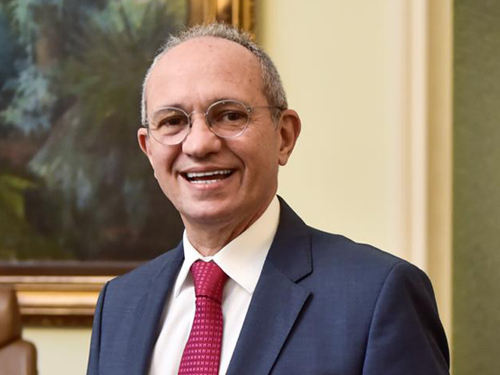A vocation for environmental leadership

Throughout my entire life I have always valued dialog and discussions based on current issues, always looking to the future and seeing the opportunities that may arise there. And Brazil is a country full of potential, with the capacity to be a world reference in a variety of metrics. Here I am not exaggerating, because I travel all across Brazil and I can perceive the will of this society, along with the diversity that our land offers us.
For example, today when we face the serious challenge of climate change, we have a great opportunity. We are already recognized worldwide for our commitment and for the advances we’ve made. But we can do more. We must contribute to the debate, take an active role, and make Brazil a leader on this issue that is so sensitive and so urgent, threatening future generations all around the planet. And we need to move now.
We have a concrete case in the planted tree sector which produces wood for industrial purposes, attaining excellent results year after year and making an unprecedented contribution to the environment. If the reader has not yet heard, planted forests (most often eucalyptus, pine, and teak) are where the wood comes from to make pulp, paper, wood panels, laminate flooring, and charcoal, among thousands of other products and by-products. It is precisely because of strategic thinking combined with sustainability that these forests are grown in areas that were degraded from other previous activities or where the soils have low fertility. And from here cascades a long and careful process so that every step, from the field to the factory, is the right one.
Today this sector has 7.8 million hectares of planted trees that store 1.7 billion tons of carbon dioxide (CO2). The products that come from these forests also serve to store carbon, mitigating the release of greenhouse gases into the atmosphere.
Biodiversity demonstrates the life that these forests help to preserve. Even though these lands occupy less than 2% of Brazil's land mass, 38% of the country's endangered mammals and 41% of endangered birds have been spotted in areas pertaining to forest companies. This is a very rich indicator, because if flora and fauna are preserved, this is a sign that the work with the environment is being done well.
Through care, investment, and developments in management techniques the tree species that are utilized in this industry were able to be adapted to different regions. From the south to the northeast, there are acres and acres being grown for specific purposes. It should be mentioned that good management and the environmental benefits generated are not just talk, since these forests are certified by the world's most prestigious organizations.
In fact, this is one of the reasons that make this sector fundamentally important to the country's exports. In 2018 it accounted for 4.1% of Brazil's trade with other countries. Besides the quality of the products, they have a seal showing they were sourced and manufactured according to the highest standards of sustainability. Countries such as China that pledged to mitigate greenhouse gas emissions at the Paris Accord are looking for alternatives like ours to meet the goals they set. Here, 100% of all paper that is sold, whether for writing, sanitary uses, or packaging, comes from planted forests.
It is also important to mention the preservation of natural forests by the sector. For each hectare of planted trees, another 0.7 hectare is preserved. At this time there are 5.6 million hectares of preserved forests, which adds up to over 2.5 billion tons of CO2 stored.
It is interesting to note that the manufacturing process is also closely linked to sustainable planning. The energy used in the manufacturing plants is renewable, making them practically self-sufficient. Whether this power derives from forest biomass or charcoal from planted forests, the factories run by companies in this sector produce 70% of the energy they consume in their production processes. Besides generating energy for their own needs, more modern pulp mills generate surplus power for sale.
This industry did not miss a beat in adapting itself to the new reality of sustainability. Technology and innovation are part of this sector, which has been researching and working to serve society, and is helping Brazil to attain its targets for international commitments — commitments which are fundamental.
In a 2017 report, the United Nations highlighted Brazil as one of the countries that have been able to fulfill the plans agreed to in the Paris Accord, which is intended to reduce emissions by between 36.1% and 38.9%. I am entirely convinced that everything we have seen so far from the planted forest sector has a decisive role in this achievement. There are reforested areas, emissions are being mitigated, renewable energy is being produced and used, and biodiversity is being preserved. But we must not stop working. We are one of the 195 countries that agreed to reduce emissions to limit the global temperature increase to 1.5 degrees Celsius. And this is very serious.
Being a part of this agreement means having a commitment to society, setting ourselves to work in an integrated manner that truly combines economics with social and environmental issues. They are not mutually exclusive, but rather complementary. Without partisanship and without preconceived notions, now is the time to think about the country; furthermore, it is time to work for the future of our children, our grandchildren, and for subsequent generations. It is possible, and Brazil has the potential to lead this process.
Without partisanship and without prejudice, now is time to work for our future generations.
By Paulo Hartung, economist and executive president of Ibá; former governor of the state of Espírito Santo (2003–2010/2015–2018)
This article was published in the newspaper O Estado de São Paulo.

